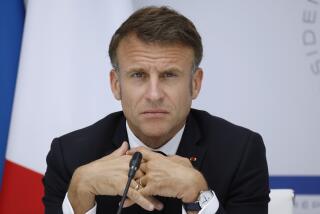Germany, France vow to keep Greece in the euro fold
- Share via
Reporting from London — Calling Greece an integral part of the Eurozone, the leaders of Germany and France vowed Wednesday to keep the currency union intact and to stave off a disruptive default by Athens as it carries out painful reforms to help beat back the debt crisis engulfing the region.
At the same time, Italy, another debt-ridden Eurozone country caught in investors’ cross hairs, approved a contentious new austerity plan in an effort to bring down a public debt that exceeds $2 trillion.
Days of market swings and mixed messages over a possible Greek default prompted an emergency conference call Wednesday evening between Greek Prime Minister George Papandreou and the heads of Europe’s two biggest nations, German Chancellor Angela Merkel and French President Nicolas Sarkozy.
The three agreed that Greece ought to remain in the Eurozone, despite a growing number of calls for it to be cut loose, and that a second international bailout for the Mediterranean nation should come into force as quickly as possible. The $150-billion rescue plan, on top of a similar package last year, was crafted by Eurozone leaders in July but remains subject to the approval of national parliaments.
A spokesman for the Greek government, Elias Mossialos, said Merkel, Sarkozy and Papandreou agreed on the “need to swiftly proceed with the implementation” of the second bailout. The three also sought to discourage the notion of a Greek exit from the Eurozone, saying Greece was “an integral part of Europe,” Mossialos said.
Whether international markets will find the assurances convincing is another story. Many investors had been hoping that the conference call would result in more concrete action by Berlin and Paris to shore up Athens, which will go into bankruptcy if it doesn’t receive its next installment of emergency loans from last year’s bailout package, due by month’s end.
Those funds, worth about $11 billion, are contingent on whether the European Union and the International Monetary Fund determine that Greece is meeting its targets on spending cuts and tax increases.
Although EU and IMF inspectors abruptly broke off talks with the Greek government this month, there are signs that the next loans will be disbursed on schedule now that Papandreou’s government has pledged to impose a controversial new property tax to generate more revenue.
In their 25-minute conversation, Merkel and Sarkozy emphasized to Papandreou the importance of Greece following through on its commitments to slash its budget deficit, statements from the two leaders’ offices said Wednesday evening.
But the debt crisis has spread beyond Greece’s borders and is now pounding Italy, whose enormous debt load is causing investors to step back in alarm and make it much more expensive for the Italian government to borrow money.
Under intense diplomatic and market pressures, representatives in the lower chamber of Italy’s Parliament approved a $70-billion austerity plan that was weeks in the making and that sparked large public protests.
The markets have hammered Italy for taking so long to come up with a program of spending cuts. The new plan, backed by Prime Minister Silvio Berlusconi, includes a tax on the rich and acceleration of a plan to raise the age at which women are allowed to retire.
Hundreds of protesters thronged the streets of Rome as the vote on the austerity plan took place Wednesday evening. It passed by a margin of 14 votes.
“The maneuver is wrong and unjust,” Antonio di Pietro, leader of the opposition Italy of Values party, told his fellow lawmakers. He called it a “depressive budget” that punished ordinary Italians.
“You are selling smoke and stealing the roast,” he said.
The wide-ranging nature of the European debt crisis was further underscored by the expected but nonetheless embarrassing cut Wednesday in the credit rating of two of France’s biggest banks.
Moody’s downgraded Societe Generale and Credit Agricole a notch each because of their exposure to Greek debt. A third French banking giant, BNP Paribas, remains under review by the ratings agency.
After Greece’s own ailing banks, French and German financial institutions hold the largest portfolios of Athens’ debt and would take a substantial hit if the nation went bust. The fate of their countries’ banking sectors in the event of a Greek default is as much on the minds of Merkel and Sarkozy as the crisis of confidence in the euro that such a move would trigger, some analysts say.
French officials tried to downplay the drop in the perceived creditworthiness of the two big banks, saying that both have a sufficient capital cushion to withstand the shock if Athens declared bankruptcy.
Special correspondent Anthee Carassava in Athens contributed to this report.
More to Read
Sign up for Essential California
The most important California stories and recommendations in your inbox every morning.
You may occasionally receive promotional content from the Los Angeles Times.











